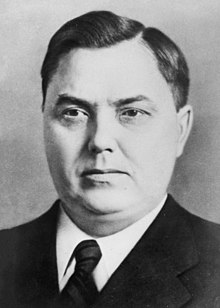
Back Georgi Malenkof AF جورجي مالينكوف Arabic جورجى مالينكوف ARZ Gueorgui Malenkov AST Georgi Malenkov AZ Маленков Георгий Максимилианович BA Георгій Максімілянавіч Малянкоў BE Георгі Малянкоў BE-X-OLD Георгий Маленков Bulgarian গেওর্গি মালেনকোভ Bengali/Bangla
Georgy Malenkov | |||||||||||||||||||||
|---|---|---|---|---|---|---|---|---|---|---|---|---|---|---|---|---|---|---|---|---|---|
Георгий Маленков | |||||||||||||||||||||
 Official portrait, 1954 | |||||||||||||||||||||
| 5th Premier of the Soviet Union | |||||||||||||||||||||
| In office 6 March 1953 – 8 February 1955 | |||||||||||||||||||||
| President | |||||||||||||||||||||
| First Deputies | |||||||||||||||||||||
| Preceded by | Joseph Stalin | ||||||||||||||||||||
| Succeeded by | Nikolai Bulganin | ||||||||||||||||||||
| Deputy Premier of the Soviet Union | |||||||||||||||||||||
| In office 9 February 1955 – 29 June 1957 | |||||||||||||||||||||
| Premier | Nikolai Bulganin | ||||||||||||||||||||
| In office 2 August 1946 – 5 March 1953 | |||||||||||||||||||||
| Premier | Joseph Stalin | ||||||||||||||||||||
| In office 15 May 1944 – 15 March 1946 | |||||||||||||||||||||
| Premier | Joseph Stalin | ||||||||||||||||||||
| |||||||||||||||||||||
| Personal details | |||||||||||||||||||||
| Born | Georgy Maximilianovich Malenkov 8 January 1902 Orenburg, Russian Empire | ||||||||||||||||||||
| Died | 14 January 1988 (aged 86) Moscow, Russian SFSR, Soviet Union | ||||||||||||||||||||
| Resting place | Kuntsevo Cemetery, Moscow | ||||||||||||||||||||
| Citizenship | Soviet | ||||||||||||||||||||
| Political party | Communist Party of the Soviet Union (Stalinists, 1956–1957) (1920–1961) | ||||||||||||||||||||
| Domestic partner | Valeriya Golubtsova (1920–1987) | ||||||||||||||||||||
| Children | 3 | ||||||||||||||||||||
| Alma mater | Moscow Highest Technical School | ||||||||||||||||||||
| Profession |
| ||||||||||||||||||||
| Religion | Atheist convert to Russian Orthodox | ||||||||||||||||||||
Central institution membership
| |||||||||||||||||||||
Georgy Maximilianovich Malenkov[b] (8 January 1902 [O.S. 26 December 1901][1] – 14 January 1988)[2] was a Soviet politician who briefly succeeded Joseph Stalin as the leader of the Soviet Union. However, at the insistence of the rest of the Presidium, he relinquished control over the party apparatus in exchange for remaining Premier and first among equals within the Soviet collective leadership. He then became embroiled in a power struggle with Nikita Khrushchev that culminated in his removal from the premiership in 1955 as well as the Presidium in 1957.
Throughout his political career, Malenkov's personal connections with Vladimir Lenin significantly facilitated his ascent within the ruling Communist Party of the Soviet Union. By 1925, he was entrusted with overseeing the party's records. This brought him into contact with Stalin who had by then successfully consolidated power as General Secretary of the Communist Party of the Soviet Union to become the de facto leader of the Soviet Union. As a result of this association, Malenkov became heavily involved in Stalin's purges before later being given sole responsibility over the Soviet missile program during World War II. From 1946 to 1947, he chaired the Council of Ministers Special Committee on Rocket Technology. In order to secure his position as Stalin's favorite, he successfully discredited Andrey Zhdanov's protegés (Alexey Kuznetsov and Nikolai Voznesensky) and Marshal Georgy Zhukov and suppressed all glory associated with Leningrad during World War II so that Moscow maintained its image as the Soviet Union's sole cultural and political capital.[3]
Following Stalin's death on 5 March 1953, Malenkov temporarily emerged as the Soviet leader's undisputed successor by replacing him as both Chairman of the Council of Ministers (or Premier) and head of the party apparatus. However, only nine days later, the Politburo (then known as the Presidium) forced him to give up the latter position while letting him retain the premiership. Subsequently, Malenkov contented himself serving as the Presidium’s highest-ranking member and acting chairman until being eclipsed in early 1954 by the party's First Secretary, Nikita Khrushchev.[4]
By 1955, he was also forced to resign as Premier. After later organizing a failed palace coup against Khrushchev in 1957, Malenkov was expelled from the Presidium and exiled to the Kazakh SSR in 1957, before ultimately being expelled from the Party altogether in November 1961. He officially retired from politics shortly afterwards. After a short sojourn in Kazakhstan, he returned to Moscow and kept a low profile for the remainder of his life.
Cite error: There are <ref group=lower-alpha> tags or {{efn}} templates on this page, but the references will not show without a {{reflist|group=lower-alpha}} template or {{notelist}} template (see the help page).
- ^ "Georgi Malenkov Dies at 86; Stalin Successor (Published 1988)". The New York Times. 2 February 1988. Archived from the original on 19 August 2023. Retrieved 19 August 2023.
- ^ Frankel, Benjamin (6 March 1992). The Cold War, 1945–1991: Leaders and other important figures in the Soviet Union, Eastern Europe, China, and the Third World. Gale Research – via Internet Archive.
Georgy Malenkov 14 jan.
- ^ "World Wars: Stalin and the Betrayal of Leningrad". BBC History. Archived from the original on 14 July 2023.
- ^ Brown, Archie (1996). The Rise and Fall of Communism. HarperCollins Publishers. pp. 232–233. ISBN 978-0-06-113882-9.